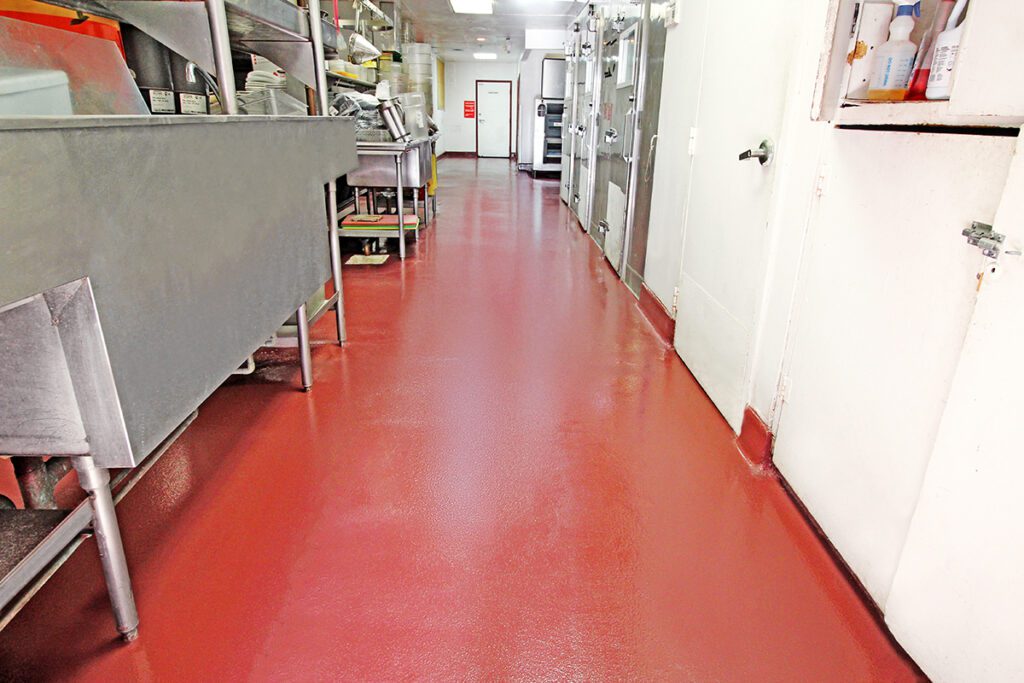Commercial Kitchen Flooring: The Ultimate Guide
by Christina
- October 18th, 2024 /
- Education,Epoxy Coat
Commercial kitchen flooring is an often overlooked but crucial element that contributes to the space’s overall productivity, efficiency, and safety. The edible creations produced within these industrial settings delight countless customers’ taste buds worldwide, but the foundation—i.e., the flooring—underpins the finely coordinated movements of chefs, bakers, cooks, and food preparers. Like any show-stopping culinary masterpiece, a high-functioning commercial kitchen demands a solid base that puts in as many hours as the talented chefs behind the line.
The following guide provides a comprehensive overview of commercial kitchen flooring, supplying you with the insight necessary to make a more informed buying decision. After highlighting the features that versatile and durable commercial kitchen flooring options should possess, our deep-dive investigates the difference in flooring requirements and options between the front-of-house (FOH) and back-of-house (BOH) sections. Finally, we explore how you can extend the life of whichever commercial kitchen flooring material you choose — and where you can find experienced and trusted installation professionals to serve your needs.
Key Considerations for Commercial Kitchen Flooring
Commercial kitchens handle greater demands and increased volume compared to the average residential kitchen. Such an extreme workload dictates prioritizing several critical flooring features, including the following:
- Safety: Kitchens are notorious for high humidity and spills, but a slip can put employees in danger of serious injury. Slip-resistant commercial kitchen flooring reduces fall risk and increases employee safety.
- Durability: In addition to supporting consistent foot traffic and heavy equipment, commercial kitchen flooring resists temperature fluctuations, scratches, and impacts.
- Hygiene: Food preparation facilities must uphold hygienic standards by complying with United States Department of Agriculture (USDA) and Food and Drug Administration (FDA) regulations, including those that apply to commercial kitchen flooring, which should incorporate antimicrobial properties to further reduce the risk of contamination.
- Chemical & Moisture Resistance: An enduring commercial kitchen floor resists cooking oils, dropped ingredients, cleaning chemicals, and the moisture that naturally accumulates around hot cooking equipment.
- Low Maintenance: High maintenance costs can cut into the bottom line of your kitchen. Reliable commercial kitchen flooring options require low-impact routine maintenance and simple cleanability.
The best commercial kitchen flooring solutions neatly package all five of these characteristics into a surface that looks as professional as it performs. While back-of-the-house aesthetics may not be of as high a priority as they are in customer-facing areas, there’s nothing that says you have to sacrifice visual appeal for effective, durable, safe, and hygienic commercial kitchen flooring.
Back of House vs Front of House Kitchen Flooring Requirements
Commercial kitchen flooring requirements vary between the front and back of the house for numerous reasons. Each space serves a distinct purpose — preparing food versus consuming it — so it’s vital to incorporate intention and branding into your final selection. Prioritizing some of the same features can optimize both spaces, but don’t underestimate the power of a cohesive front-of-house to match the culinary strength of your back-of-house.
Back of House (BOH) Flooring Needs
A commercial kitchen houses multiple work areas, from preparation and dishwashing stations to cooking areas and storage. Durable, slip-resistant, and easy-to-clean flooring fosters a long-lasting, safe, and low-maintenance work environment throughout the back of the house. Westcoat offers several commercial kitchen flooring solutions to achieve each of these goals.
Westcoat’s Temper-Crete™ systems bond directly with concrete and comply with USDA, FDA, and ADA regulations. This urethane cement chemistry resists cleaning chemicals, thermal shock, abrasion, heat, and impacts, all with minimal downtime required for application and curing. Westcoat offers the Temper-Crete™ Rake Trowel (RT) System and Temper-Crete™ Self-Leveling (SL) System in two distinct formulations: one incorporating silica sand (Temper-Crete™ RTB and Temper-Crete™ SLB) and the other quartz sand (Temper-Crete™ CA-30 Small Safe Grip, and CA-31 Large Safe Grip products. Ranging in texture from least to most aggressive, these non-skid flooring solutions feature clear and pigmented coatings. All three can be added to numerous Westcoat sealers and topcoats, while the Small and Large Safe Grip products mix well with epoxies and polyaspartics.
Finally, Westcoat’s Double Broadcast (Dubro) Epoxy System allows you to tailor the level of texture to fit your needs. This chemical- and impact-resistant epoxy coating is seamless and highly durable. Choose from several ANSI-safe colors or select Dubro Quartz to integrate quartz sand into the clear base coat for a terrazzo-like look.
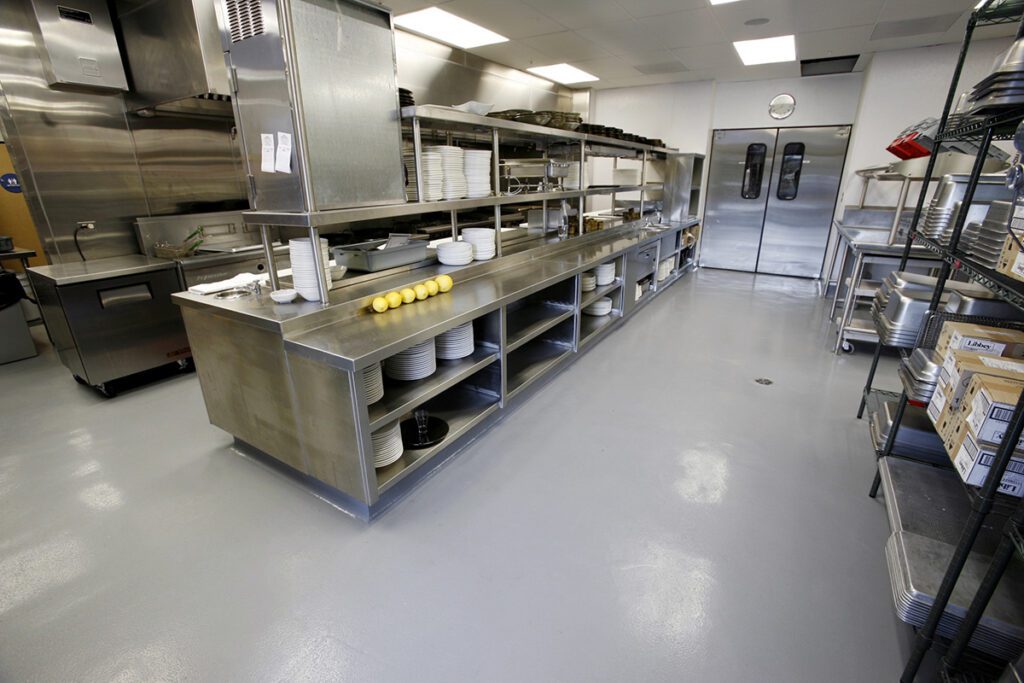
Front of House (FOH) Flooring Needs
Flooring within customer-facing sections should balance durability with an aesthetic appeal. Although entry points, serving stations, and dining areas may feature distinct color schemes or textures, the need for an enduring and alluring solution remains. Complement your commercial kitchen flooring with front-of-house floors that speak directly to your brand and your mission.
Many front-of-house flooring options are cost-effective without sacrificing a professional and polished appearance. When you invest in a front-of-house flooring solution that performs as well as it looks, you can turn your attention to the most important people: your customers.
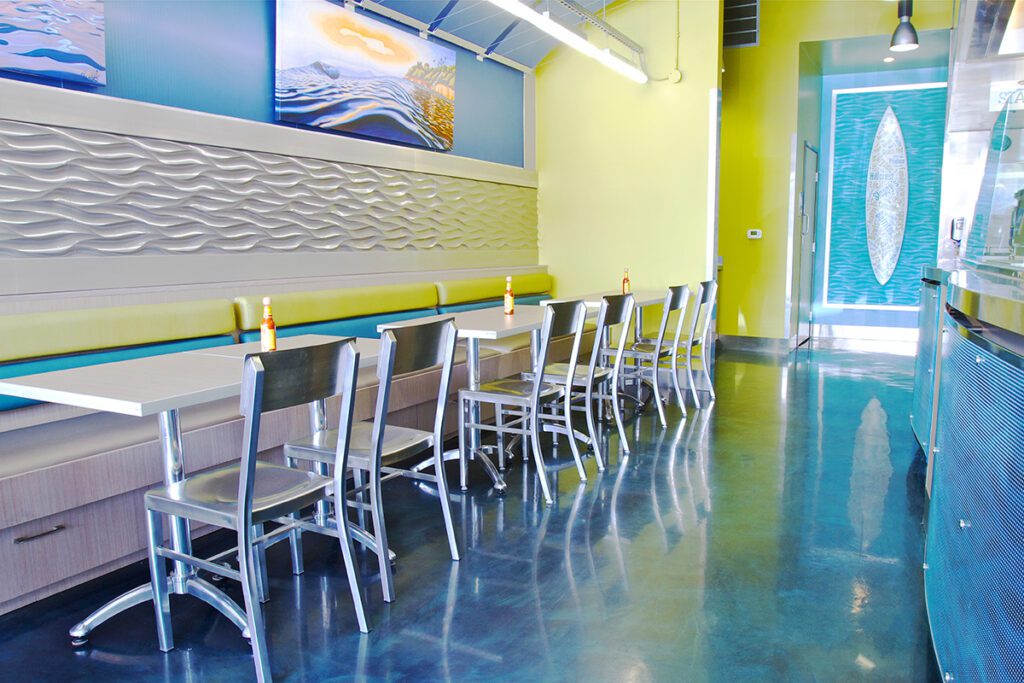
Top Commercial Kitchen Flooring Materials
Commercial kitchen flooring materials options for back-of-house installations include epoxy coatings, urethane cement, slip-resistant coatings, quarry tile, and rubber or vinyl sheets. Unlike front-of-house solutions, these installed commercial kitchen floors must comply with FDA requirements.
Epoxy Systems
As one of the more common commercial kitchen flooring solutions, epoxy coatings benefit from fast installation and the option of customizing colors and patterns to align with branding cues. Epoxy flooring offers a seamless, chemical-resistant, durable, and impact-resistant finish that meshes effortlessly with a commercial kitchen’s everyday activities. The anti-slip additives also increase the friction coefficient of epoxy flooring. Westcoat’s Double Broadcast Epoxy System (Dubro) offers many of the benefits associated with epoxy flooring solutions.
Quartz-blended epoxy flooring systems, such as Westcoat’s Dubro Quartz, combine the durability and seamless nature of epoxy flooring with the added texture and aesthetic appeal of quartz aggregates. This type of flooring offers enhanced slip resistance and a variety of design options, making it an ideal choice for commercial kitchen environments where safety and branding are essential.
Urethane Cement Systems
The Temper-Crete™ Rake Trowel (RT) System and Temper-Crete™ Self-Leveling (SL) System from Westcoat embody the benefits of urethane cement flooring. This USDA, FDA, and ADA-compliant commercial kitchen flooring creates a seamless finish that resists dirt, thermal shock, heat, chemicals, abrasions, and impacts. You can also customize your Temper-Crete™ installation by selecting between silica and quartz sand.
Slip-Resistant Topcoats and Systems
A slip-resistant surface is essential for reducing the risk of slipping and falling on polished concrete or traditional tile surfaces. Westcoat’s CA-33 Aluminum Oxide: Non-Skid Additive can be used with epoxies, polyurethane sealers or topcoats, and polyaspartics. This robust topcoat provides a seamless surface, ideal for high-traffic areas that also host heavy equipment.
Quarry Tile
Quarry tile offers significant advantages over natural stone tile cousin in commercial kitchens due to its durability, slip resistance, and low maintenance requirements. Its cost-effectiveness and ability to withstand high temperatures make it an ideal choice for high-traffic areas, ensuring safety and longevity in demanding environments.
Although quarry tiles resist water, they can become slippery when wet. During installation, quarry tiles must be leveled perfectly to avoid cracking, and even then, they’re not a seamless solution. Quarry tiles also remain cold and rocky, which is not necessarily ideal for employees who stand for the majority of their shifts.
Rubber or Vinyl Sheets
Rubber and vinyl sheets offer an affordable, non-porous, and cushioning flooring solution that’s often used in personal fitness centers. However, these sheets incorporate seams that allow for bacteria growth and moisture retention. The oil and grease found in most kitchens can also coat vinyl and rubber flooring and increase the chances of slipping and falling.
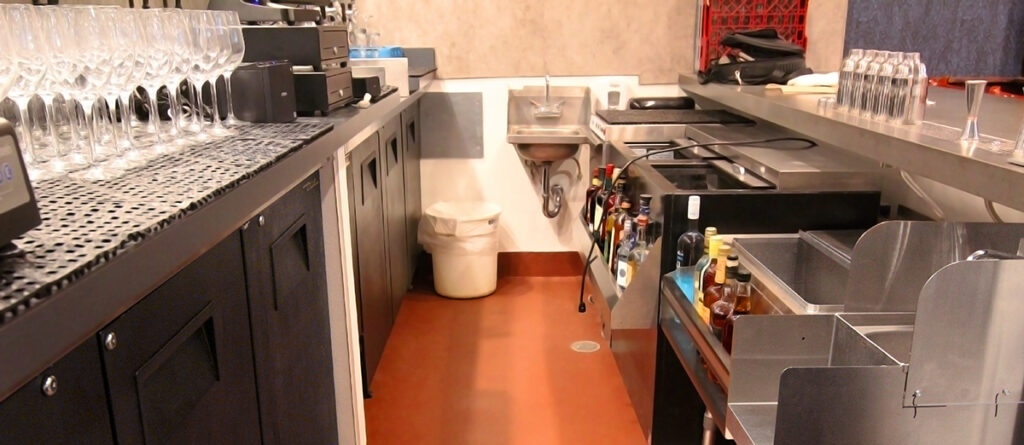
Front of House Restaurant Flooring Options
Most of the commercial kitchen flooring options mentioned above can also enhance the front of house. However, the front of house is not subject to the same FDA requirements as the back of house, which presents new opportunities to style your space. Vinyl, ceramic tile, and natural stone flooring are standard options for front-of-house flooring. Although each solution has its own advantages and disadvantages, none completely meets the demands of such a space, at least not for more than a few years at a time.
Vinyl
Despite vinyl’s cost-effective nature and availability in multiple colors, patterns, and styles, few rely on it to withstand heavy foot traffic long-term. Vinyl can be softer than concrete, but its harder porous counterpart is just as prone to collecting moisture. In addition to significant upkeep, vinyl also suffers from varying skid resistance, a lack of seamless design, and susceptibility to scratches and cuts.
Ceramic Tile
Although slightly more expensive, ceramic tile can seem like an improvement over vinyl—at least on the surface. Ceramic tile retains the styling cues and easy-to-clean nature of vinyl, but the tile’s strength also leads to its downfall. Tiles can easily stain if left unattended, and cracked tiles require immediate replacement to maintain hygienic standards and a professional look.
Natural Stone
The bump up to natural stone can cost more than you bargained for, with little return beyond that of ceramic tile or vinyl. Natural stone may look the part, but it’s a high-maintenance solution plagued by grout that can harbor bacteria. Stone also presents an uncomfortably hard surface that can fatigue busy feet but requires proprietary cleaning solutions that won’t scratch the finish.
Adapting Back-of-House Flooring for Front-of-House Appeal
While back-of-house areas prioritize functionality and durability, many of the same flooring options, like epoxy, can also elevate the aesthetics of front-of-house spaces. These flooring solutions not only meet high-performance standards but also offer versatile design choices that enhance the look and feel of customer-facing areas, combining style with long-lasting durability. Seamlessly meshing your front-of-house flooring with your brand identity couldn’t be easier with the following Westcoat products:
- Liquid Dazzle®: This USDA-compliant self-leveling epoxy flooring solution features a seamless application identifiable by the metallic effects it produces — and its easy-to-clean surface.
- Grind & Seal System: If you want a rustic feel, the Grind & Seal System achieves a flat sheen that requires minimal investment and upkeep.
- Tidalstone®: Featuring a polished concrete look, Westcoat’s Tidalstone coating is moisture tolerant and thermal shock resistant.
- Acid Stain Grind & Seal System: Westcoat offers this coating solution, which leverages chemical processes for a mottled effect that’s sealed for durability.
- Fast Stain™ Polish System: Achieve a decorative finish on existing concrete with this Westcoat system, which features unlimited colors and varying degrees of gloss.
- TC Interior System: Choose from a variety of textures, colors, and patterns and incorporate skid resistance into this high-performing cementitious coating.
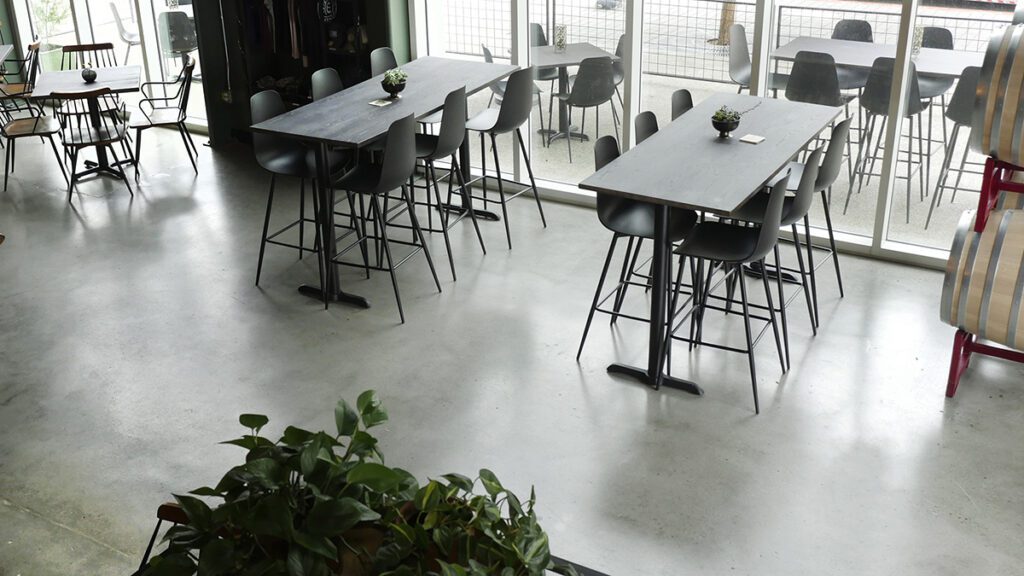
How to Extend the Life of Kitchen Flooring
Prolonging the longevity of your commercial kitchen flooring requires the same approach as your heavy equipment and front-of-house furniture. Routine cleanings after every service help maintain a clean environment, while periodic deep cleanings ensure every inch complies with health and safety regulations. These in-depth scrubbings also allow you to identify and address any issues before they compound.
Investing in the proper cleaning solutions can also help maintain your commercial kitchen flooring. To uphold best practices, tailor industrial cleaners and sanitizing chemicals to the installed flooring. Avoid oil- or wax-based products that can promote falls.
Rubber mats placed at various stations throughout the back of house can also minimize the wear and tear on commercial kitchen flooring. These anti-fatigue mats provide a barrier between the floor and the walking surface, soaking up spills while reducing slippery conditions. Cleaning these rubber mats can also be incorporated into nightly wash-down duties, and replacing them costs significantly less than installing brand-new flooring.
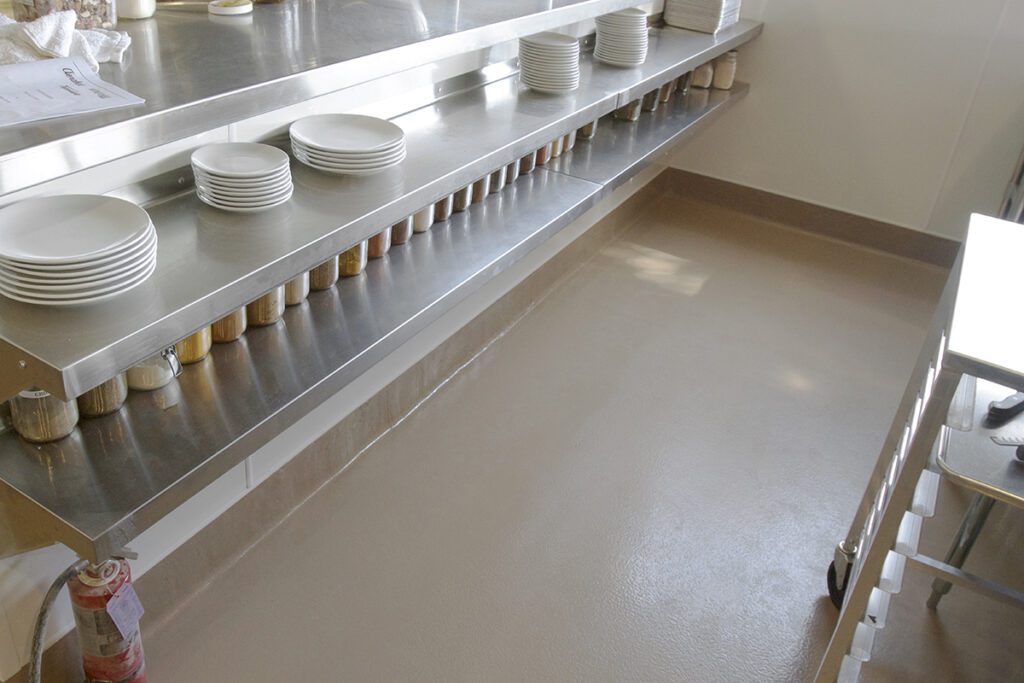
Work With a Commercial Kitchen Flooring Expert
Consulting with a flooring professional is essential when selecting the right flooring systems for a restaurant kitchen. These experts understand the unique requirements of commercial kitchen environments and can guide you in making informed decisions that enhance safety, durability, and functionality. By evaluating your specific needs and considering factors such as maintenance, compliance, and return on investment, a flooring professional can help you choose the best flooring solutions that meet your operational goals.
After 40 years in the flooring industry, Westcoat prides itself on durable, innovative commercial kitchen flooring solutions that serve our customers when and where they need the most support. Contact us to learn more about any of the commercial kitchen flooring products mentioned above. Call us at 1-800-250-4519 to speak to our knowledgeable and friendly staff and discuss your needs for commercial kitchen flooring solutions.
